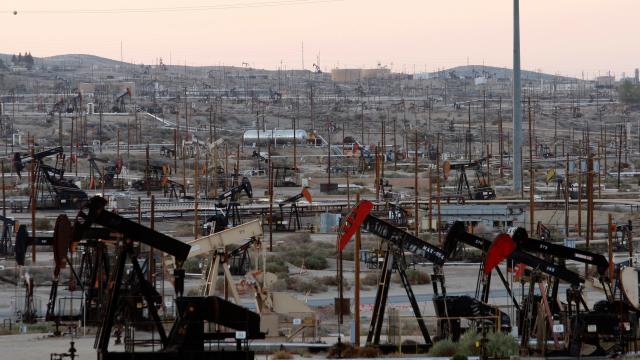Stop me if you’ve heard this one before: The world is on track to blow past the climate goals outlined in the Paris Agreement. Despite record fossil fuel-demand drop amid the pandemic, fossil fuel companies are still planning to produce more oil, gas, and coal in the coming decade, and governments are aiding and abetting them.
That creates a so-called “production gap” — how much fossil fuel companies plan to produce versus how much we need to reduce fossil fuel production to meet the Paris Agreement goals — which is chronicled in a new report from the United Nations Environment Program. While the report shows we’re in trouble, it contains a key message for how governments can get off the path to ruin. The authors borrow a phrase you may have heard if you’ve followed U.S. politics for the past year: “Build back better.” The idea that President-elect Joe Biden’s climate plan will single-handedly close the fossil fuel production gap is pure fantasy, but his coming presidency could be a start for the U.S. — and the world.
[referenced id=”1625885″ url=”https://gizmodo.com.au/2020/12/every-major-bank-has-now-ruled-out-funding-arctic-drilling/” thumb=”https://gizmodo.com.au/wp-content/uploads/2020/12/02/jdhtrwafpb7etj5mdvlq-300×168.jpg” title=”Every Major U.S. Bank Has Now Ruled Out Funding Arctic Drilling” excerpt=”We got another one. On Monday evening, Bank of America said that it will no longer finance fossil fuel exploration in the Arctic, joining Goldman Sachs, Morgan Stanley, Chase, Wells Fargo, and CitiBank, which all announced similar policies this year. That means no major U.S. bank will fund oil and…”]
This is the second annual Production Gap report. Last year’s contained a similarly stark message even as the specter of the covid-19 pandemic gathered on the horizon. While the world looks dramatically different today, with millions of people who have gotten sick or died, the economy stagnating, and demand for fossil fuels low, there’s also a real risk of going back to how things were. The report shows that production needs to decline by 6% per year through 2030. Yet countries’ production plans are set to increase oil, gas, and coal extraction by 2% per year over that period. That will create a production gap that will cause the world to overshoot the Paris Agreement target of 2 degrees Celsius (3.6 degrees Fahrenheit) by 50% and the more ambitious but crucial 1.5 degrees Celsius (2.7 degrees Fahrenheit) target by 120%. The report doesn’t include Brazil, Mexico, and a number of other countries with plans to ramp up fossil fuel production, indicating the gap could be even wider.
“The pandemic-driven demand shock and the plunge of oil prices this year has once again demonstrated the vulnerability of many fossil-fuel-dependent regions and communities,” Ivetta Gerasimchuk, a lead author of the report and researcher at the International Institute for Sustainable Development, said in a statement. “The only way out of this trap is diversification of these economies beyond fossil fuels. Alas, in 2020 we saw many governments doubling down on fossil fuels and entrenching these vulnerabilities even more.”
No single country can close the gap; fossil fuels need to be wound down everywhere. But the incoming Biden administration has a chance to change course in the U.S. and abroad. The report has six recommendations for all countries to close the gap under Biden’s tagline of building back better, though the report doesn’t mention him or his incoming administration by name.
Among the recommendations are ensuring new stimulus efforts are green and avoiding “further carbon lock-in,” supporting fossil fuel communities, more transparency around production, reducing government incentives for fossil fuels while increasing production restrictions, and crafting a global plan. Biden’s climate plan includes many of those elements. He has called for ending fossil fuel subsidies and new extraction on public lands. On the stimulus front, his transition site includes calls for an economic recovery through building “modern infrastructure and an equitable, clean energy future,” and his climate plan includes a commitment to invest 40% of a proposed $US2 ($3) trillion climate and infrastructure plan into “disadvantaged communities” as well as help for coal communities. Many of the Trump administration’s rollbacks intended to goose oil and gas production will be nullified under Biden as well.
But the administration will also need to come up with a plan to phase out oil and gas production everywhere, including leases already in operation on public lands, as well as fracking, a process Biden has said he will not outright ban. Reinstating Obama-era rules won’t be enough, either. Biden needs to go further by setting stricter standards for pollution from power plants, tailpipes, and even farm fields. And while coal towns have been hurting for decades, oil and gas towns are at the start of that cycle of decline. A just transition plan has to include places and workers dependent on all forms of fossil fuels.
Biden has also said he would rejoin the Paris Agreement and go further in international ambitions. Being an active participant instead of a climate quitter may end up being the most consequential way the administration can help close the gap. The report notes the most effective way to ensure a smooth transition is if it’s “led by countries collectively, as they send the directional signals that energy producers, consumers, and investors follow.”
The U.S. is one of the biggest fossil fuel producers in the world, and as the largest historical polluter, has to do its fair share. But addressing the climate crisis could end up being a golden opportunity to re-engage since the world can act immediately and the benefits accrue for every country. There are roadblocks, such as the potential of a Republican-controlled Senate, and self owns, such as advisers who have favoured the disastrous all-of-the-above approach to energy and fossil fuel-funded appointees. But as the report shows, the planet doesn’t really care about that. It cares about cold, hard emissions reductions, and the time to tinker around the edges is over (cough, cough, Green New Deal).
“The policy solutions are available,” the report notes. “What is required is the political will and international cooperation to realise them.”
